Legend Read online
Page 4
When I open the door, Thomas coughs nervously at the surprised look on my face and pretends to smile. (There is a streak of black grease on his forehead, probably from his own index finger. Which means he just finished polishing his rifle earlier in the evening, and his patrol’s inspection is tomorrow.) I cross my arms. He touches the edge of his cap politely.
“Hello, Ms. Iparis,” he says.
I take a deep breath. “I’m heading out to the track. Where’s Metias?”
“Commander Jameson has requested that you come with me to the hospital as soon as possible.” Thomas hesitates for a second. “It’s more of an order than a request.”
There’s a hollow feeling in the pit of my stomach. “Why didn’t she just call me?” I ask.
“She prefers for me to escort you.”
“Why?” My voice starts to rise. “Where’s my brother?”
Now Thomas takes a deep breath. I already know what he’s going to say. “I’m sorry. Metias has been killed.”
That’s when the world around me goes silent.
As if from a great distance, I can see that Thomas is still speaking, gesturing with his hands, pulling me to him for a hug. I hug him back without realizing what I’m doing. I feel nothing. I nod when he steadies me and asks me to do something. To follow him. He keeps an arm around my shoulders. A dog’s wet nose nudges my hand. Ollie follows me out of the apartment, and I tell him to stay close. I lock the door and stuff the key into my pocket and let Thomas guide us through the darkness to the stairs. He’s talking the whole time, but I can’t hear him. I stare straight ahead at the reflective metal decorations lining the stairwell, at the distorted reflections of Ollie and me.
I can’t make out my expression. I’m not sure I even have one.
Metias should have taken me with him. This is my first coherent thought as we reach the bottom floor of our high-rise and climb into a waiting jeep. Ollie jumps into the backseat and sticks his head out the window. The car smells damp (like rubber and metal and fresh sweat—a group of people must’ve ridden in here recently). Thomas sits in the driver’s seat and makes sure my seat belt is buckled. Such a small, stupid thing.
Metias should have taken me with him.
I run this thought over and over again in my head. Thomas doesn’t say anything else. He lets me stare out at the darkened city as we go, occasionally shooting me a hesitant glance. Some small part of me makes a mental note to apologize to him later.
My eyes glaze over at the familiar buildings we pass. People (mostly workers hired from the slums) pack the first-floor stands even with the lights out, hunched over bowls of cheap food in the ground level cafés. Clouds of steam float high in the distance. JumboTrons, always on, regardless of power shortages, display the latest warnings about floods and quarantines. A few are about the Patriots—this time for another bombing up in Sacramento that killed half a dozen soldiers. A few cadets, eleven-year-olds with yellow stripes on their sleeves, linger on the steps outside an academy, the old and worn Walt Disney Concert Hall letters almost completely faded. Several other military jeeps cross our intersection, and I see the blank faces of their soldiers. Some of them have black goggles on so I can’t see their eyes at all.
The sky looks more overcast than usual—signs of a rainstorm. I pull my hood over my head in case I forget when we finally get out of the car.
When I turn my attention back to the window, I see the part of downtown that sits inside Batalla. All the lights in this military sector are on. The hospital’s tower looms just a few blocks away.
Thomas notices me craning my neck for a better view. “Almost there,” he says.
As we draw near, I can see the crisscrossed lines of yellow tape surrounding the bottom of the tower, the clusters of city patrol soldiers (red stripes on their sleeves, like Metias), as well as some photographers and street police, the black vans and medic trucks. Ollie lets out a whine.
“I’m guessing they didn’t catch the person,” I say to Thomas.
“How do you know?”
I nod toward the building. “That’s really something,” I continue. “Whoever it was survived a two-and-a-half-story jump and still had enough strength to escape.”
Thomas looks toward the tower and tries to see what I see—the broken third-floor stairwell window, the taped-off section right below it, the soldiers searching alleyways, the lack of ambulances. “We haven’t caught the guy,” he admits after a moment. The rifle grease on his forehead gives him a bewildered look. “But that doesn’t mean we won’t find his body later.”
“You won’t find it if you haven’t found it yet.”
Thomas opens his mouth to say something, then decides against it and goes back to concentrating on the road. When the jeep finally rolls to a stop, Commander Jameson breaks away from the group of guards she’s standing with and marches over to my car door.
“I’m sorry,” Thomas says abruptly to me. I feel a brief pang of guilt for my coldness and decide to nod back at him. His father had been a janitor for our apartment high-rise before he died, his late mother a cook at my grade school. Metias had been the one to recommend Thomas (who had a high Trial score) to be assigned to the prestigious city patrols, despite his humble background. So he must feel just as numb as I do.
Commander Jameson walks up to my car door and raps twice on the window to get my attention. Her thin lips are painted an angry stroke of red, and in the night her auburn hair looks dark brown—almost black.
“Move it, Iparis. Time is of the essence.” Her eyes flicker to Ollie in the backseat. “That’s not a police dog, kid.” Even now, her demeanor is unflinching.
I step out of the jeep and give her a quick salute. Ollie jumps down next to me. “You called for me, Commander,” I say.
Commander Jameson doesn’t bother to return my gesture. She starts walking away, and I’m forced to hurry along beside her, struggling to fall into step. “Your brother, Metias, is dead,” she says. Her tone doesn’t change. “I’m of the understanding that you are almost done with your training as an agent, correct? That you’ve already finished your courses on tracking?”
I fight hard to breathe. A second confirmation of Metias’s death. “Yes, Commander,” I manage to say.
We head into the hospital. (Waiting room is empty; they’ve cleared out all patients; guards are clustered near the stairwell entrance; that’s probably where the crime scene starts.) Commander Jameson keeps her eyes forward and her hands behind her back. “What was your Trial score?”
“Fifteen hundred, Commander.” Everyone in the military knows my score. But Commander Jameson likes to pretend not to know or care.
She doesn’t stop walking. “Ah, that’s right,” she says, as if it is the first time she’s heard it. “Maybe you’ll be of use after all. I’ve called ahead to Drake and told them that you are dismissed from further training. You were almost done with your coursework anyway.”
I frown. “Commander?”
“I received a full history of your grades there. Perfect scores—you’ve already finished most of your courses in half the number of years, yes? They also say you’re quite a troublemaker. Is this true?”
I can’t understand what she wants from me. “Sometimes, Commander. Am I in trouble? Did they expel me?”
Commander Jameson smiles. “Hardly. They’ve graduated you early. Follow me—there’s something I want you to see.”
I want to ask about Metias, about what happened here. But her icy demeanor stops me.
We walk down a first-floor hall until we reach an emergency exit door at the very end of it. There, Commander Jameson waves away the soldiers guarding it and ushers me through. A low growl rumbles in Ollie’s throat. We step out into open air, this time at the back of the building. I realize that we are now inside the yellow tape. Dozens of soldiers stand in clusters around us.
“Hurry up,” Commander Jameson snaps at me. I quicken my pace.
A moment later, I realize what she wants to show me a
nd where we are walking. Not far ahead is an object covered in a white sheet. (Six feet long, human; feet and limbs look intact under the cloth; definitely didn’t fall naturally like that, so someone had to lay him out.) I start to tremble. When I look down at Ollie, I see that the fur on his back is standing up. I call to him several times, but he refuses to walk any closer, so I’m forced to follow Commander Jameson and leave him behind.
Metias kissed me on my forehead. “Forever and ever, kid, until you’re sick and tired of seeing me.”
Commander Jameson halts in front of the white sheet, then bends down and throws it aside. I stare down at the dead body of a soldier clad in military black, a knife still protruding from his chest. Dark blood stains his shirt, his shoulder, his hands, the grooves of the knife hilt. His eyes are closed now. I kneel before him and smooth strands of his dark hair away from his face. It’s odd. I don’t take in any details of the scene. I still feel nothing but that deep numbness.
“Tell me about what might have happened here, cadet,” Commander Jameson demands. “Consider this a pop quiz. This soldier’s identity should motivate you to get it right.”
I don’t even inch from the sting of her words. The details rush in, and I start talking. “Whoever hit him with this knife either stabbed him from close range or has an incredibly strong throwing arm. Right-handed.” I run my fingers along the blood-caked handle. “Impressive aim. The knife is one of a pair, correct? See this pattern painted on the bottom of the blade? It cuts off abruptly.”
Commander Jameson nods. “The second knife is stuck in the wall of the stairwell.”
I look toward the dark alley that my brother’s feet point to and notice the sewer cover several yards away. “That’s where he made his getaway,” I say. I estimate the direction the sewer cap is turned in. “He’s also left-handed. Interesting. He’s ambidextrous.”
“Please continue.”
“From here, the sewers will take him deeper into the city or west to the ocean. He’ll choose the city—he’s probably too wounded to do otherwise. But it’s impossible to track him accurately now. If he has any sense, he’ll have taken half a dozen turns down there and done it in the sewer water too. He wouldn’t have touched the walls. He’ll give us nothing to track.”
“I’m going to leave you here for a bit, so you can collect your thoughts. Meet me in two minutes in the third-floor stairwell so you can give the photographers some room.” She glances once at Metias’s body before she turns away—for a brief second, her face softens. “What a waste of a good soldier.” Then she shakes her head and leaves.
I watch her go. The others around me stay a good distance away, apparently eager to avoid an awkward conversation. I look down at my brother’s face again. To my surprise, he appears peaceful. His skin looks tan, not pale like I’d assumed it would. I half expect his eyes to flutter, his mouth to smile. Bits of dried blood flake off onto my hands. When I try to brush them off, they stick to my skin. I don’t know if this is what sets off my anger. My hands start shaking so hard that I press them against Metias’s clothes in an attempt to steady them. I’m supposed to be analyzing the crime scene . . . but I can’t concentrate.
“You should have taken me with you,” I whisper to him. Then I lean my head against his and begin to cry. In my mind, I make a silent promise to my brother’s killer.
I will hunt you down. I will scour the streets of Los Angeles for you. Search every street in the Republic if I have to. I will trick you and deceive you, lie, cheat and steal to find you, tempt you out of your hiding place, and chase you until you have nowhere else to run. I make you this promise: your life is mine.
Too soon, soldiers come to take Metias to the morgue.
0317 HOURS.
MY APARTMENT.
SAME NIGHT.
THE RAIN HAS STARTED.
I lie on the couch with my arm draped over Ollie. The spot where Metias usually sits is empty. Stacks of old photo albums and Metias’s journals clutter up the coffee table. He’d always loved our parents’ old-fashioned ways, and kept handwritten journals just like how they’d kept all these paper photos. “You can’t trace or tag them online,” he always said. Ironic coming from an expert hacker.
Was it just this afternoon that he’d picked me up from Drake? He’d wanted to talk to me about something important, right before he left. But now I’ll never know what he had to say. Papers and reports cover my stomach. One of my hands clutches a pendant necklace, a piece of evidence I’ve been studying for a while now. I squint at its smooth surface, its lack of patterns. Then I drop my hand with a sigh. My head hurts.
I learned earlier why Commander Jameson pulled me out of Drake. She’s had her eye on me for a long time. Now she suddenly has one less in Metias’s patrol, and she’s looking to add an agent. A perfect time to nab me before other recruiters do. Starting tomorrow, Thomas is taking over Metias’s position for the time being—and I’m entering the patrol as a detective agent in training.
My first tracking mission: Day.
“We’ve tried a variety of tactics to catch Day in the past, but none of them have worked,” Jameson told me just before she sent me home. “So. Here’s what we’ll do. I’ll continue with my patrol’s projects. For you, let’s test out your skills with a practice run. Show me how you’d track Day. Maybe you’ll get somewhere. Maybe not. But you’re a set of fresh young eyes, and if you impress me, I’ll promote you to be a full agent on this patrol. I’ll make you famous—the youngest agent out there.”
I close my eyes and try to think.
Day killed my brother. I know this because we found a stolen ID tag lying halfway up the third-floor stairwell, which led us to the soldier pictured on the tag, who stammered out a description of what the boy looked like. His description didn’t match anything we have on file for Day—but the truth is, we know little about what he looks like, except that he’s young, like the kid at the hospital tonight. The fingerprints on the ID tag are the same prints found just last month at a crime scene linked to Day, prints that don’t match any civilian the Republic has on record.
Day was there, in the hospital. He was also careless enough to leave the ID tag behind.
Which makes me wonder. Day broke into the laboratory for medicine as part of a desperate, last-minute, poorly thought-out plan. He must have stolen plague suppressants and painkillers because he couldn’t find anything stronger. He himself certainly doesn’t have the plague, not with the way he was able to escape. But someone else he knows must, someone he cares enough about to risk his life for. Someone living in Blueridge or Lake or Winter or Alta, sectors all recently affected by the plague. If this is true, Day won’t be leaving the city anytime soon. He’s bound here by this connection, motivated by emotions.
Day could also have a sponsor who hired him to pull this stunt. But the hospital is a dangerous place, and a sponsor would’ve had to pay Day a great deal of money. And if that much money was involved, he certainly would have planned more thoroughly and known when the laboratory’s next shipment of plague medicine would arrive. Besides, Day wasn’t a mercenary in any of his past crimes. He’s attacked the Republic’s military assets on his own, slowed down shipments to the warfront, and destroyed our warfront-bound airships and fighter jets. He has some sort of agenda to stop us from winning against the Colonies. For a while we thought he might work for the Colonies—but his jobs are crude, without high-tech equipment or noticeable funding behind them. Not really what you’d expect from our enemy. He’s never taken jobs for hire as far as I know, and it’s unlikely he’d start now. Who would hire an untested mercenary? Another possible sponsor is the Patriots—but if Day had been working for them on this job, one of the Patriots would’ve drawn their signature flag (thirteen red and white stripes, with fifty white dots on a blue rectangle) on a wall somewhere near the crime scene by now. They’d never miss a chance to claim victory.
But the biggest thing that doesn’t compute for me is this: Day has never killed anyone befo
re. That’s another reason why I don’t think he’s connected to the Patriots. In one of his past crimes, he crept into a quarantine zone by tying up a street policeman. The policeman didn’t have a scratch on him (except a black eye). Another time, he broke into a bank vault but left the four security guards at its back entrance untouched—although a bit stupefied. He once torched a whole squadron of fighter jets on an empty airfield in the middle of the night and has on two occasions grounded airships by crippling their engines. He once vandalized the side of a military building. He’s stolen money, food, and goods. But he doesn’t set roadside bombs. He doesn’t shoot soldiers. He doesn’t attempt assassinations. He doesn’t kill.
So why Metias? Day could’ve made his escape without killing him. Did Day hold some sort of grudge? Had my brother done something to him in the past? It couldn’t have been accidental—that knife went straight through Metias’s heart.
Straight through his intelligent, stupid, stubborn, overprotective heart.
I open my eyes, then lift my hand and study the pendant necklace again. It belongs to Day—fingerprints told us that much. It’s a circular disk with nothing engraved on it, something we found lying on the floor of the hospital’s stairwell along with the stolen ID. It’s not from any religion I know of. It’s worth nothing in terms of money—cheap nickel and copper, the necklace part made of plastic. Which means he probably didn’t steal it, and it has a different meaning for him and is worth carrying around with the risk of losing or dropping it. Maybe it’s a good luck charm. Maybe it was given to him by someone he has emotional ties with. Maybe this is the same person he tried to steal plague medicine for. It has a secret; I just don’t know what.
Day’s exploits used to fascinate me. But now he is my matched enemy—my target. My first mission.
I gather my thoughts for two days. On the third day, I call Commander Jameson. I have a plan.
I’M DREAMING THAT I’M HOME AGAIN. EDEN SITS on the floor, drawing some sort of loopy shape on the floorboards. He’s about four or five years old, with cheeks still round with baby fat. Every few minutes he gets up and asks me to critique his art. John and I are crouched together on the sofa, trying in vain to fix the radio that we’ve had in our family for years. I can still remember when Dad brought it home. It’ll tell us which quarters have plague, he’d said. But now its screws and dials sit worn and lifeless in our laps. I ask Eden for help, but he just giggles and tells us to do it ourselves.

 The Midnight Star
The Midnight Star Legend
Legend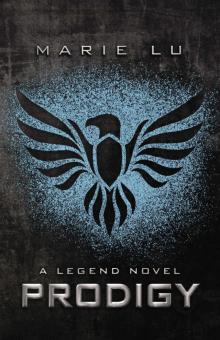 Prodigy
Prodigy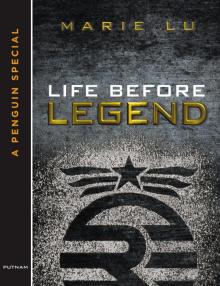 Life Before Legend
Life Before Legend Legend Trilogy Boxed Set
Legend Trilogy Boxed Set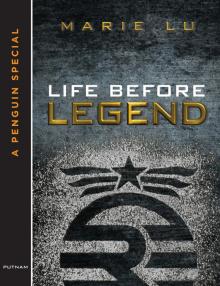 Life Before Legend: Stories of the Criminal and the Prodigy
Life Before Legend: Stories of the Criminal and the Prodigy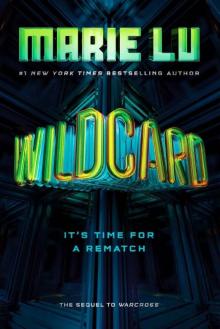 Wildcard
Wildcard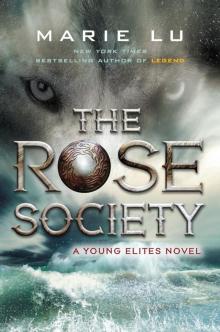 The Rose Society
The Rose Society Warcross
Warcross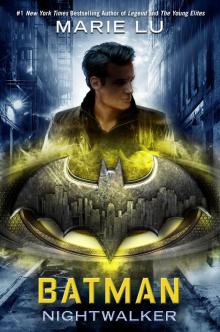 Batman: Nightwalker
Batman: Nightwalker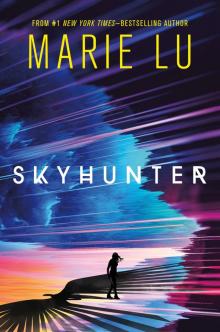 Skyhunter
Skyhunter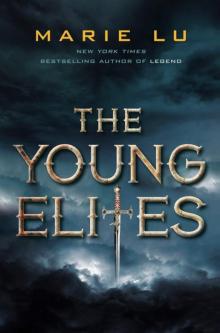 The Young Elites
The Young Elites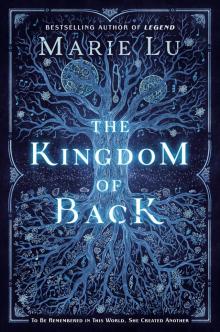 The Kingdom of Back
The Kingdom of Back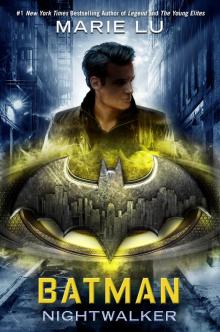 Batman
Batman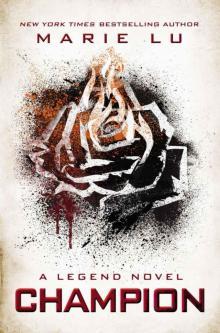 Champion: A Legend Novel
Champion: A Legend Novel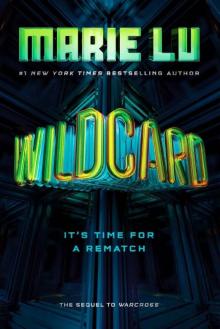 Wildcard (Warcross)
Wildcard (Warcross)